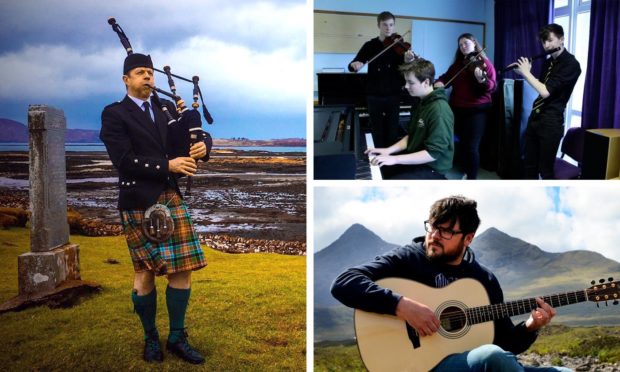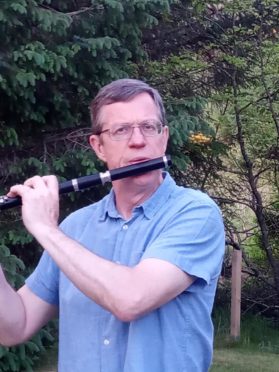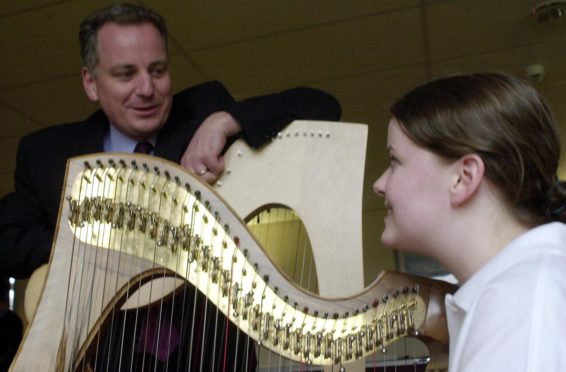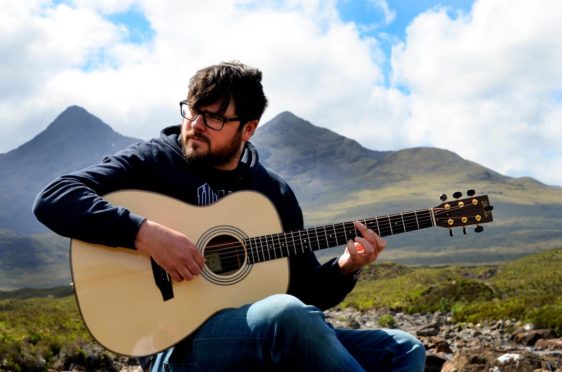Dougie Pincock doesn’t like being called a rock star – it’s a genre thing – but when the idea of new National Centres for Excellence across Scotland first surfaced, he was a pretty big deal.
He had been a member of the Battlefield Band for much of the 1980s and made a decent living the decade after teaching on the Feis circuit, bringing out a solo album, working as a session musician and eventually working full-time in Glasgow’s National Piping Centre.
So he certainly had the skills, experience and contacts book to be centre manager for a new project in Plockton, on the west coast, which was coming into being at the turn of the millennium.
All the same, Dougie – who used to be in a band called Robbie Shepherd’s Nightmare – remembers the decision to take him on as “brave”.
He said: “I’m not a teacher. Teachers applied for the job and the easy and sensible thing would have been to give it to one of them.
“I commend them for taking on a musician – and not just because I got a brilliant job out of it.”
Plockton Music School: The making of
The Scottish Executive, as it was then, set up a fund to create National Centres of Excellence and invited bids from all-comers.
A group of education folk in Highland Council came together and submitted a bid for a music school based on the popular Feis movement.
For those not familiar, this was a system that had some of the best musicians and teachers in their respective fields tutoring kids at events throughout the north, usually in school holidays.
The bid was successful and – after a slightly rocky start that involved a daily commute to Skye because Plockton wasn’t ready – Dougie was on board and the school was a goer.
How do you set up a school?
When Plockton got the go-ahead, the building wasn’t physically ready, so those first few pupils had to commute to Skye – and Dougie himself was still coming up from the central belt.
He said: “We started with 10 kids and we lost one of them within three weeks because they were travel sick.”
But things settled down, and these days the staff and pupils know what to expect a little more.
The audition process is in three stages from initial meeting to induction week, and Dougie says it’s not easy.
Plockton Music School takes pupils in all secondary years, although most start at third year or above.
Students have 10 formal hours of music a week and the working day can finish as late as 8.45pm. In sixth year, music becomes a dedicated subject and Thursdays and half of Wednesday is given over to it.
They might make amazing music, but students are taught more than just an instrument.
As Dougie puts it, “they need to set up the PA, sell the CDs, know where the kitchen is to make a cup of tea….”
Here is a glimpse of what last year’s intake are now capable of:
After Plockton: Where did they go?
Dougie says, of the 190 pupils who have passed through the school (and he can name most of them without thinking about it), he reckons only 10 are full-time musicians.
Among the former pupils are some pretty big names on Scotland’s music scene, though: Norrie MacIver, lead singer with Skipinnish; Highland musician and artist Mairearad Green and songwriter, tutor and all-round muso Innes Watson (more on his story later).
Others have gone on to become doctors, political hopefuls and advocates for disabled rights.
Dougie said: “What’s important is that this isn’t a hothouse for professional musicians. The school wasn’t created to feed the industry, but to feed the community.”
Former pupils: Feel the love
Just like TripAdvisor, the way to tell how much of a success Plockton has been is by getting some reviews.
Back to Innes Watson, who was a pupil at Plockton Music School in its early years. From the Borders, he made the move north and west and now, as he explains, his life has come full circle.
Innes, now 36, said: “I was very lucky to get one-on-one tuition from Iain MacFarlane and Jack Evans. They changed my views and approach to my instruments and attitude towards life.”
After Plockton, Innes went on to receive a Bachelor of Arts in Scottish Music at the RSAMD in Glasgow and, alongside his writing and performing, taught guitar at the Royal Conservatoire Scotland.
He added: “I now live on Skye and could not be happier to say I’m back teaching at the music school. It’s like a stumbling dream of a loop that I’ve travelled and once again, I feel at home.”
Another FP, Sally Simpson, now 26, came from Edinburgh to study at Plockton for her sixth year. She is now a freelance musician and fiddle teacher, playing with bands Heisk and Westward the Light – both of which are more than 50% comprised of ex-Plockton pupils.
She said: “My time at Plockton was quite possibly the best year of my life and I squeezed every moment out of it that I possibly could.
“I felt like I’d finally found my people, and in the most beautiful location for any school in Scotland.
“If I could, I’d have my time there all over again – my only regret is not joining the school earlier than sixth year.”
What next for Plockton Music School?
It doesn’t take an expert to tell you times are tough in the music industry.
But still, the school has more pupils due to arrive in a few weeks for a new term.
Dougie says that there are changes coming to careers advice to meet the challenges of the permanent changes Covid has brought.
But, as he says: “There are people that have to be musicians and we have to support them.”
More from the Schools & Family team
Meet the man who says he can save Gaelic by teaching us all to speak it in weeks
Music stars welcome free tuition announcement
MAP: Find a family-friendly walk for an easy day out in the school holidays



